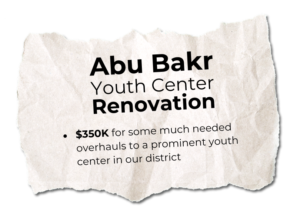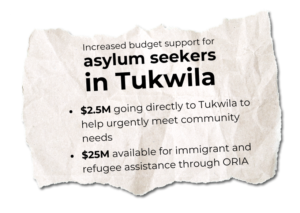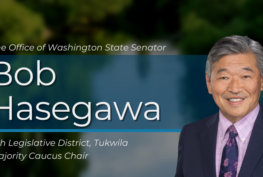Dear neighbors,
With the end of the 2024 short (60 days) legislative session, I wanted to take a moment to reflect on the progress we have made and ground ourselves in the work ahead. We got a lot of good work done in this short session but there’s still a long way to go making sure our systems work for everyone and not just the wealthy, and well-connected. Incidentally, 95.8% of bills passed during the 2024 legislative session did so with bipartisan support, many passed unanimously.
As this year was a “short” session year, our budgets are supplemental to the biennial budget passed last year, i.e. smaller and not intended to cover entire topics such as public education and transportation. Still we added significant money in the budget for public education and transportation.
We also fought hard for (and won) meaningful consumer protection reforms, supporting housing, advancing healthcare, promoting economic growth and jobs, student safety in our schools and public safety on our streets, fighting the opioid epidemic, increasing behavioral health supports, and much more.
Here’s a look at some of what we’ve accomplished together that’s important for our District:
Asylum seekers in Tukwila & other important projects
This year, I worked closely with several key leaders on securing dollars for many important projects. One of the most notable perhaps was securing money to help tackle the asylum seeker crisis in Tukwila. We listened to local leaders and we responded to help get incoming families sheltered, improve services, fix the systemic gaps in our state’s immigration policies, and clearly demonstrate that our claim of being a welcoming state is more than just a slogan.
In the capital budget, our district got precious resources for several projects such as:




Social Housing
We have done much to try and address housing and yet we continue to move backwards therefore, we need to approach our housing crisis differently. Our state has a long-standing tradition of “tackling housing” by merely providing more incentives for developers to do what developers are already doing. I get that–build more shelter. But as Einstein once said, doing the same things over and over and expecting a different result is the definition of insanity. It’s not that this strategy is completely lost on me but I think it’s the wrong basket to put all of our eggs in—therefore, please allow me to introduce you to ‘Social Housing.’
After years of neglected investment into our public housing infrastructure, President Reagan drastically shifted our country’s Housing strategy to supply side for the private sector. This meant that our prime directive shifted from government funded Housing initiatives to mere incentives (i.e. tax breaks) for developers for doing what many developers were already doing, building. Even worse, this gives developers power to manipulate the market by undersupplying, thereby raising values and costs. While the benefits of some supplier incentives is not completely lost on me, we’ve been chasing the holy grail of developer-based housing ever since, expecting benefits to trickle down to home buyers and renters. This has proven to be a failed strategy, which is made very clear by the magnitude in which the Housing crisis is outpacing us, thus proving Einstein’s theory.
The public (not private developers) is the only entity with the capacity to develop adequate housing supply to offset the need. Social Housing is a variant of what we used to know as public housing, but is a strategy which is as much about building community as it is about providing shelter. It’s about cultivating homes within our neighborhoods, not just houses. Social Housing develops community by making sure there is diversity of goods, services, residents, and recreational opportunities. The basic needs of households are accessible within the community: affordable homes regardless of what your definition of “affordable” is, but also shopping, classrooms, open spaces, etc. With intergenerational mixed use residential facilities with mixed incomes and ownership opportunities, and ultimately mixing people and their families. It leads to more diverse and prosperous fundamental community units which in turn chip in to a more functional and more inclusive society by taking us back to our roots as a group-oriented species. Some things were not broken before capitalism came and “fixed” them.
I introduced SB 5975 to help spur along this paradigm shift in how we think about housing and communities by allowing usage of Housing Trust Fund dollars (as well as other pools of funds) for the purpose of Social Housing. The bill didn’t get out of committee, but it accomplished this purpose. I am I’ll be bringing it back in force next session.
State Bank
Some may say the conversation above on Social Housing sounds like a pipe dream because we’ll never be able to finance it. Enter: State Bank.
Financing is the cornerstone to every action we take as a state government. A Washington State Public Bank is a time honored solution to creating dramatically larger public financing capacity. It would follow a proven model to make the best use of our taxpayer dollars by investing in our communities rather than Wall Street.
Our infrastructure, everything from housing to roads to public health facilities to schools demands public financing capacity. Unfortunately, the state is already bouncing off it’s Constitutional debt ceiling so we’ll continue to struggle with maintaining the infrastructure we have. Any new infrastructure is pretty much out of the question without significant increases in taxes to finance it. Public banking is an inevitability if we’re going to remain competitive in the world marketplace.
I have given presentations on public banking around the state from individuals to large groups and city councils. Many of you know I’ve been working on this issue for over a decade and would love to hear your feedback or questions on it. If you’d like a presentation to learn more about this tremendous public financing tool, contact my office and let’s schedule something.
Public Safety
We’re changing the culture of policing.
In 2023, the Washington State Legislature invested $11.4 million to open three new Criminal Justice Training Commission Regional Training Academies. By offering potential recruits training closer to their homes, we are addressing staffing shortages and strengthening the essential bond between officers and the communities, they seek to protect. 2023 saw $1.28 million invested in diversifying officer recruitment, getting agencies the staff they need while taking a strong step towards more representative law enforcement.
SB 5424, sponsored by Senator Lovick, will allow agencies to adopt flexible work schedules. Flexible work schedules are going to help departments staff busy weekends and retain parents, those pursuing higher education, and senior officers who cannot maintain a 40-hour workweek. This bill helps working single parents, gives agencies the freedom they need to keep valuable officers employed, and provide enough officers on duty to keep our neighborhoods safe.
In the budget we removed the need for local law enforcement agencies to pay for the training of their officers. The State of Washington will insure that every single law enforcement agency has access to the best quality training at absolutely no cost to the community.
Healthcare
We prioritized healthcare accessibility across the board with upgrades to telemedicine, behavioral health, and more.
SB 5481 establishes the Uniform Telehealth Law to expand access to medical providers while ensuring that healthcare directed by anyone outside the state meet the standards of care provided by those within Washington state. This makes our state the first in the nation to pass the Uniform Law Commission’s model legislation to define telehealth.
SB 5580 expands access to pre- and post-natal care for some of the most vulnerable pregnant people in our state by raising the income ceiling for Apple Health eligibility and creating supports for those suffering from substance use disorder.
SB 5821 ensures that audio-only telemedicine services established during the pandemic remain accessible in Washington and follow uniform standards for medical care.
SB 6228 makes numerous improvements to the state’s struggling substance use disorder treatment system by providing new protections for patients seeking care in the community.
SB 6127 expands access to post-exposure prophylaxis (PEP) medication that can prevent HIV infection if taken immediately after potential HIV exposure. This bill requires insurers to cover the medication at no charge to the patient and mandates that hospitals dispense the medication as appropriate to patients in emergency settings.
SJM 8006– did not pass, unfortunately, but it called for a Universal Healthcare system. We asked for the Federal Government to either help us create one or get out of our way and let us do it ourselves. This is not just a symbolic gesture—it’s one of the most important polices of our time and I intend to reintroduce it as many times as it takes to get the job done. Washington state is in the unique position to pull this off and show the rest of the nation how to prioritize #PeopleOverProfits.
A Washington State Consumer Protection Package
Here are a few bills that were passed unanimously through both chambers you might be interested in. These bills help give back to Washingtonians by adding key fixes to the Office of the Insurance Commissioner; the statewide elected office in charge of consumer protections and all things insurance regulations.
SB 5213 adds much-needed oversight and transparency to Pharmacy Benefit Managers (PBMs) to help lower drug costs for Washingtonians.
SB 5806 closes a loophole that prevented the OIC from gathering critical data needed to protect the public in emergencies and natural disasters.
SB 5798 gives homeowners more time to find new insurance when they are surprised by a “nonrenewal” notice, providing them a better chance to ensure their homes are protected.
SB 5842 helps protect individual Social Security numbers from unnecessary dissemination, ensuring timelier insurance claim settlements and reducing the risk of identity theft.
Session Priorities:
As Majority Caucus Chair, my office helps maintain the order and flow of the Democratic Caucus’ priorities which span every committee. My goal is always to approach policy with an equitable and inclusive lens, and to center voices from the working families and small businesses of our state.
Beyond my work as Majority Caucus Chair, my policy prioritizes:
Housing
A housing market our children can thrive in
Housing is a human right and access to housing is our collective responsibility. We can choose to create a Washington that our children and grandchildren can live and home-own in.
Homelessness
Prevention and services save lives
It’s not enough to simply expand our housing supply – we also have to help keep people in their current homes, especially renters who have less stability. This also means better access to behavioral and mental health support.
Public Safety
Safe and walkable communities for everyone
I’m committed to making our communities safer. We continue to be intolerant of violence, abuse and oppressiveness, as we should. It’s also our job as legislators to look at data and find real solutions that actually work—that’s what I try to do every day.
State Bank
Empowering Washingtonian wallets
Financing is the cornerstone to every action we take as a state government. The Washington State Public Bank follows a proven model to give our communities the tools they need to invest in a brighter future.
Access to Healthcare
Healthcare infrastructure, accessibility, and insurance
Healthcare is a human right. We are leading the nation on access to children’s healthcare and reproductive rights, and universal healthcare is next.

Signing off
It’s no secret that I am a Universal Healthcare proponent, proud Labor champion, and a leading voice in the people’s movement for a State Bank, but I have also heard community calls to tackle our Housing crisis, thoughtfully address our Homelessness epidemic, and help create a more community-centric culture of Public Safety. These are challenges that I will continue to fight for justice on—especially over the interim/summer so please stay plugged in.

Due to election-year ethics restrictions, I am not able to post, email newsletters or do anything to communicate with our District until election results are certified after the November election. You can still contact my office anytime.
-Bob Hasegawa,
11th Legislative District Senator




